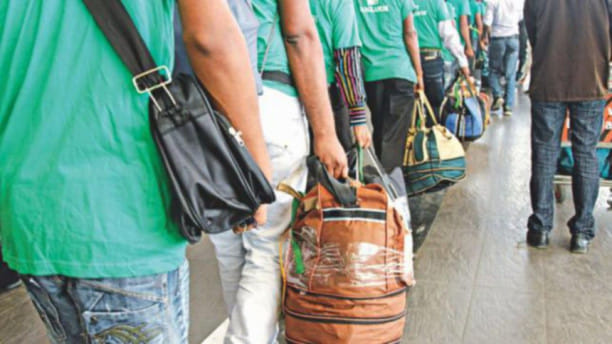Addressing the crisis in Bangladeshi labour migration

Migrant workers are undoubtedly the true heroes. They consistently contribute to the economy by bringing in foreign currency, yet their efforts often go unrecognised, and they receive minimal support from the relevant officials and manpower agencies.
The decline in the number of Bangladeshi migrant workers is a wake-up call for the country's policymakers and stakeholders. The interim government must prioritise governance reforms to address the systemic challenges facing migrant workers.
Establishing a dedicated migration commission and increasing budget allocations for migration issues are essential steps toward creating a more robust system. Implementing policy reforms, enhancing skills development programmes for workers, and creating safe job opportunities for women must also be at the forefront of these efforts.
Furthermore, improving the transparency of recruitment processes and strengthening training centres will contribute to a more reliable migration system.
This approach is not only crucial for ensuring the safety and security of migrant workers but also vital for maintaining the integrity of Bangladesh's labour migration ecosystem.
A report published in The Daily Star on January 2 (Migration saw 22pc drop last year: report) also brings forth a troubling situation. While expatriates sent home USD 26.9 billion last year, marking a 23 percent year-on-year increase, the number of individuals seeking overseas employment has plummeted by 22.5 percent.
A total of 1,011,856 individuals sought overseas employment, down from 1,305,856 the previous year, according to the Bureau of Manpower, Employment, and Training (BMET).
This paints a picture of a sector that is not only a pillar of our national economy but also a lifeline for many families.
Equally concerning is the steep decline in female migrant workers, with only 54,696 women finding opportunities abroad last year, reflecting a 22 percent drop compared to the previous year.
The downward trajectory of female migration not only threatens their economic independence but also deprives families of essential financial support.
According to the report titled "Labour Dynamics of Labour Migration from Bangladesh in 2024" by the Refugee and Migratory Movements Research Unit (RMMRU), systemic corruption and irregularities have significantly impacted the opportunities for labour migration.
Notably, Malaysia reopened its labour market in 2021 under a syndicate but subsequently shut it down again in May 2024. This syndicate misappropriated US $2 billion, inflating migration costs and leaving many workers stranded abroad or forcing them to return home.
Moreover, migration to several countries, including Oman, Bahrain, the UAE, and the Maldives, has remained suspended throughout 2024 due to various issues, including falsified documents.
These developments point to a pressing need for reforms in the migration sector to prevent further loss of opportunities for workers.
The decline in Bangladeshi migrant workers also presents an opportunity for policymakers to reevaluate and reform the labour migration system. By tackling corruption, enhancing training and skills development, and establishing safer pathways for migration, Bangladesh can secure the futures of its citizens and bolster national development through remittances, a major source of foreign currency.
The time for action is now; the future of countless families depends on it.
Hasan Meer is a journalist at The Daily Star




 For all latest news, follow The Daily Star's Google News channel.
For all latest news, follow The Daily Star's Google News channel.
Comments